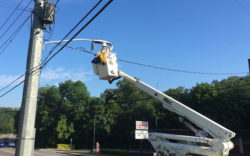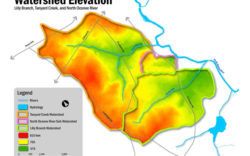People in Athens are so excited about solar power that they not only recently packed the Unitarian Universalist Fellowship of Athens for a “solar town hall,” but not even a pile of free pizza at the back of the room could distract most attendees from the presentation. “Put solar on it” is almost the new “put a bird on it,” but it’s not quite that simple. Here’s what you need to know.
Most residential solar installations are grid-connected: Your panels generate DC electricity and an inverter converts it to AC and synchronizes it with the power on the grid. While we will soon see more battery storage systems like the Tesla Powerwall, battery storage has historically been only cost effective as an alternative to long power lines to remote locations.
Until recently, there have been two types of solar grid connections in Georgia. One uses two meters—one to record the solar energy fed to the grid and another to record energy consumed by your house. You pay your normal bill for the power you use, and you are paid for the power you put onto the grid. Early adopters in Georgia Power’s limited solar buyback program got paid about $0.17 per kilowatt-hour (kWh). The new Advanced Solar Initiative is easier to get into, but has a lower feed-in tariff.
Less common is a net-metering scenario, where a bi-directional meter spins forward when you consume more than you generate, and backward when you generate a surplus. You pay (or get paid) for the monthly net balance, but for the most part in Georgia, any net production is paid at the utility’s avoided cost, which is much lower than the retail rate that you pay.
On July 1, the Solar Power Free-Market Financing Act of 2015 took effect in Georgia. This means that a solar financing company can install panels on your roof and either sell you the electricity directly (a power purchase agreement) or lease you the equipment. This option has little to no up-front cost to the customer, but can lock you into a contract with increasing fees, and is not necessarily the best long-term economic choice. According to Pete Marte, CEO of Hannah Solar, third-party financing is better geared for commercial sites where business owners can take advantage of a wide range of commercial tax incentives.
“I prefer the option of owning the panels personally,” Public Service Commissioner Tim Echols says. “A big advantage of ownership is that once your electric bill savings recoup the initial cost, the remaining electric bill savings are all a bonus. It will probably take you 12 years to break even, though.”
The Federal Housing Administration offers PowerSaver loans to help homeowners finance their own systems, and Jackson EMC also offers its customers solar financing options.
Another perk of ownership is that you retain the Solar Renewable Energy Credits (SRECs) for the generated electricity. There is no market for SRECs in Georgia, but Echols says, “As we move forward in implementing the new EPA Clean Power Plan, the SRECs may take on greater value.”
Those interested in solar should act soon, as the federal tax incentive will drop from 30 percent of the system cost to 10 percent at the end of 2016. According to Marte, this has led to a rush on panels, and potential customers need to get in line.
Homeowners who miss out on solar, whether due to too much shade or lack of financing, can still take action now. The golden rule of renewable energy is to first get as energy efficient as possible. It is almost always more cost effective to add insulation, upgrade HVAC equipment and replace lighting than it is to install solar.
We can also expect to see more utility-scale solar projects in Georgia, which are much cheaper than residential systems. According to a presentation by Amory Lovins of the Rocky Mountain Institute at the Appalachian Energy Summit in Boone, NC last July, utilities are now installing solar farms at the same cost per megawatt as a new coal plant. Georgia Power and Jackson EMC customers who want to see more of this can vote with their wallets and pay into the Premium Green Energy program with their monthly bill.
Got a question for the Greensplainer? Email [email protected].
Like what you just read? Support Flagpole by making a donation today. Every dollar you give helps fund our ongoing mission to provide Athens with quality, independent journalism.









